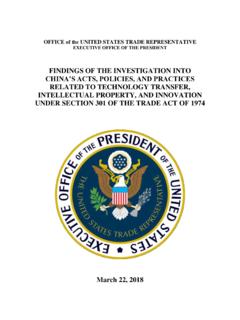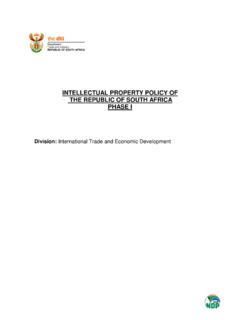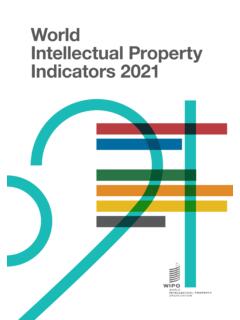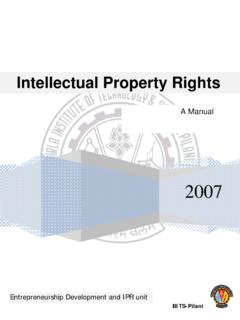Transcription of Intellectual property rights in India - GOV.UK
1 Intellectual property rights in IndiaIntellectual property Office is an operating name of the Patent OfficeContentsIntellectual property rights in India ..3 What are Intellectual property rights ? ..3 International considerations ..3 Treaties and reciprocal agreements ..4 Intellectual property rights systems in India ..4 Copyright ..4 Patents .. marks ..5 Registering and enforcing Intellectual property rights in India ..5 Enforcing IP rights in India ..6 Self-help considerations ..6 Potential problems faced in India and how to deal with them ..7 Avoiding problems ..7 Who should take responsibility for your IP protection? ..8 Where to get Intellectual property help in India ..81 Intellectual property rights in IndiaIntellectual property rights in IndiaIndia is one of the UKs priority overseas you plan to do business in India , or if you are already trading there, it is essential to know how to use, guard and enforce the rights you have over the Intellectual property (IP) that you or your business guide explains about IP in general, and gives guidance on how to apply these principles in the Indian market.
2 It describes the issues you may face with IP infringement in India , offers advice on how you can effectively tackle these, and provides links to sources of further are Intellectual property rights ? Intellectual property (IP) is a term referring to a brand, invention, design or other kind of creation, which a person or business has legal rights over. Almost all businesses own some form of IP, which could be a business types of IP include: y Copyright this protects written or published works such as books, songs, films, web content and artistic works; y Patents this protects commercial inventions, for example, a new business product or process; y Designs this protects designs, such as drawings or computer models; y Trade marks this protects signs, symbols, logos, words or sounds that distinguish your products and services from those of your competitors.
3 IP can be either registered or unregistered IP, you automatically have legal rights over your creation. Unregistered forms of IP include copyright, unregistered design rights , common law trade marks and database rights , confidential information and trade registered IP, you will have to apply to an authority, such as the Intellectual property Office in the UK, to have your rights recognised. If you do not do this, others are free to exploit your creations. Registered forms of IP include patents, registered trade marks and registered design rights . Copyright is also considerationsIndia has been a World Trade Organisation (WTO) member since 1995. WTO member nations must include some IP protection in their national laws.
4 This means that if you are doing business with India , you will find some similarity between local IP law and enforcement procedures, and those in force in the property rights in IndiaTreaties and reciprocal agreementsIndia is also a signatory to the following international IP agreements: y the Paris Convention under this, any person from a signatory state can apply for a patent or trade mark in any other signatory state, and will be given the same enforcement rights and status as a national of that country would be; y the Berne Convention under this, each member state recognises the copyright of authors from other member states in the same way as the copyright of its own nationals; ythe Madrid Protocol under this, a person can file a single trade mark application at their national office that will provide protection in multiple countries; y the Patent Cooperation Treaty this is a central system for obtaining a bundle of national patent applications in different jurisdictions through a single application.
5 India is not a signatory to the Hague Agreement, which allows the protection of designs in multiple countries through a single property rights systems in IndiaCopyrightIndia is a signatory to the Berne Convention on copyright. However, it may be a good idea to register your copyright as doing so may help to prove ownership if there are criminal proceedings against infringers. In most cases though, registration is not necessary to maintain a copyright infringement claim in India . Registration is made, in person or via a representative, with the Copyright Office. Since 2016, copyright policy was moved to India s Ministry of Commerce and Industry. All IPRs are now administered by the Department for Industrial property and Promotion (DIPP).
6 Internet piracy of films, music, games and software is an issue in India , as is unauthorised copying of physical s Patents Act of 1970, 2003 Patent Rules and the 2016 Patent Amendment Rules set out the law concerning patents. As in the UK, there is no provision for utility model regulatory authority for patents is the Patent Registrar under the office of the Controller General of Patents, Designs and Trade Marks, which is part of India s Ministry of Commerce and Industry. Patents are valid for 20 years from the date of filing an application, subject to an annual renewal s patent law operates under the first to file principle that is, if two people apply for a patent on an identical invention, the first one to file the application will be awarded the laws governing designs are the Designs Act 2000 and the Designs Rules 2001.
7 Designs are valid for a maximum of ten years, renewable for a further five marksIndia s trade mark laws consist of the 1999 Trade Marks Act and the Trade Marks Rules of 2002 and regulatory authority for patents is the Controller General of Patents, Designs and Trade Marks under the Department of Industrial Policy and Promotion. The police now have more robust powers in enforcing trade mark law, including the ability to search premises and seize goods suspected of being counterfeit without a warrant. But these powers are tempered by the requirement for the police to seek the Trade Mark Registrar s opinion on the registration of the mark before taking action. This adds to the delay and may result in counterfeit goods being removed or names also constitute a form of trade mark in India , with protection, irrespective of existing trade names, for those wishing to trade under their own of the widespread practice of cybersquatting the registration in bad faith of marks by third parties registering domain names for certain well known marks in order to sell them to the original rights owners it is advisable for rights owners to register their domain names in India as trade marks as soon as takes up to two years.
8 A trade mark in India is valid for ten years and can be renewed thereafter indefinitely for further ten-year and enforcing Intellectual property rights in IndiaTo enjoy most types of Intellectual property (IP) rights in India , you should register patents, individual registrations must be made in India , but for rights other than industrial designs you can apply under the terms of the Patent Cooperation Treaty, which is usually easier and trade marks, you should register them within India , either through the domestic trade mark system or under the Madrid copyright, no registration is required but registering copyrights with the copyright authorities is advisable. Priority rights under the Paris Convention can help in the local registration of trade marks, designs and patents by allowing rights previously registered elsewhere to become effective in India , if filed within a time property rights in IndiaEnforcing IP rights in IndiaIP rights can be enforced by bringing actions to the civil courts or through criminal prosecution.
9 India s IP laws set out procedures for both civil and criminal proceedings, as does the Competition Act. Criminal proceedings do not apply to patent and design disadvantage of civil litigation is that you are unlikely to recover large damages, and punitive damages against an infringer are rare. However, if you have an identified infringer, it may be advisable to launch civil litigation, because if an interim injunction is granted the infringement can be halted pending the outcome of the case. Damages are routinely awarded in cases of copyright piracy and trade mark infringement (which come under criminal litigation); less so in patent cases. Over the years, however, decisions in favour of foreign companies against local infringers have demonstrated the judiciary s impartial approach.
10 As in other countries, the Indian Government brings actions in criminal cases, although in most cases actions follow complaints to magistrates or police authorities by rights owners. Criminal proceedings against infringers carry the prospect of much harsher remedies, including fines and or negotiation with an infringer can also be effective as an alternative form of dispute resolution. The Civil Procedure Code provides for a formal mediation considerationsThere are various things you can do to make it harder in general for infringers to copy your product. For example, you could: yThink about the design of your product, and how easy it would be for somebody to reproduce it without seeing your original designs; y When you hire staff, have effective IP-related clauses in employment contracts.
















